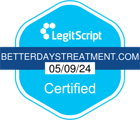Start by Reviewing Your Insurance Policy Details
Before beginning the rehab admissions process, it’s essential to understand what your insurance policy covers when it comes to addiction treatment. At Better Days Treatment, we guide clients through this process step by step, but it always starts with you becoming familiar with your plan’s specifics. Every insurance provider—and often, every policy within the same provider—has different coverage levels, requirements, and provider networks.
Start by locating your insurance card and logging into your member portal (or calling the customer service number listed on your card). Review what services are listed under behavioral health or substance use disorder treatment. When reviewing your insurance policy, it’s important to find out whether inpatient rehab is covered, if outpatient treatment is included, whether detox services are part of your benefits, and if pre-authorization is required before beginning care. Understanding these details will help you know what to expect and avoid unexpected costs during treatment.
If you find this language confusing, don’t worry. Many people do. That’s why the team at Better Days Treatment offers free insurance verification support—we’ll help decode the policy and explain what’s covered in plain terms.
Get a Clinical Assessment or Referral When Required
Most insurance companies require a clinical evaluation before approving coverage for rehab services. This is typically used to determine the medical necessity of treatment and identify the appropriate level of care—detox, inpatient rehab, partial hospitalization, or outpatient therapy. You may need to obtain this assessment from a licensed mental health or substance abuse professional who is in-network with your insurance provider.
In some cases, your primary care physician can also submit a referral or document the need for treatment. If you’re unsure where to begin, Better Days Treatment can arrange a clinical intake assessment that meets most insurers’ documentation standards.
The results of the assessment will be included in your insurance approval request. The more detailed and accurate the evaluation, the smoother the approval process will be. It’s important to be honest and thorough when discussing your symptoms, history, and needs.
Submit a Pre-Authorization Request to Your Provider
Once the clinical documentation is ready, the next step is to submit a pre-authorization (sometimes called prior authorization) request to your insurance provider. This is a formal request that includes medical records, diagnosis codes, and a recommended level of care. The insurance company will review this information to determine if the proposed treatment is medically necessary and eligible under your policy.
At Better Days Treatment, we handle this process directly with the insurance provider on behalf of our clients. We ensure all required paperwork is complete and submitted accurately and promptly. Without this step, your insurance may deny coverage or delay treatment approval, so it’s crucial to get it right the first time.
The response time varies—some approvals happen within 24–72 hours, while others may take longer depending on the provider and urgency of the case. If your case is urgent, our admissions team can flag it for expedited review.
Understand the Terms of Approval and Your Responsibilities
If your insurance provider approves your rehab services, it’s important to carefully review the terms of the approval. This means understanding what portion of the treatment is covered, what deductibles or co-pays you may be responsible for, the length of treatment that has been approved (such as 30 days of inpatient care), and any specific limitations, like the requirement to attend only in-network facilities.
Better Days Treatment will walk you through these details before admission. Our goal is transparency—so you know what’s paid for, what isn’t, and what to expect financially before beginning treatment.
It’s also worth noting that insurance providers often review progress throughout treatment. They may only approve a portion of care at first and extend coverage based on ongoing clinical assessments. That’s why accurate record-keeping and treatment documentation are essential, and we take that responsibility seriously on your behalf.
Know What to Do If You’re Denied Coverage
Insurance companies don’t approve every request for rehab services right away. If your request is denied, it doesn’t mean your journey has to stop. At Better Days Treatment, we support clients through the appeals process, helping to resubmit documentation or provide additional evidence of medical necessity.
You have the right to request a peer-to-peer review, where a clinician from your treatment center speaks directly with the insurance provider’s reviewer to explain why rehab is essential for your recovery. In many cases, this additional conversation can result in an approval reversal.Still have questions? This might point you in the right direction.
How Can I Verify If a Rehab Center Accepts My Insurance Plan?
In the meantime, we also discuss alternative payment options like sliding scale fees or financial aid to ensure treatment is not delayed. Recovery is too important to put on hold, and we work hard to find a path forward for every individual who needs care.

